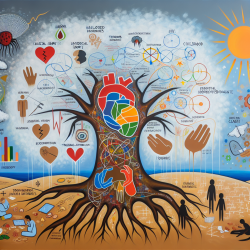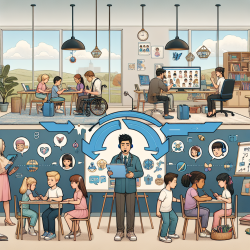The assessment of activity and participation in children with disabilities is a crucial component of special education and rehabilitation services. The recent study titled "Structural Validity of an ICF-Based Measure of Activity and Participation for Children in Taiwan’s Disability Eligibility Determination System" offers valuable insights into the use of the Functioning Disability Evaluation Scale (FUNDES-Child) for this purpose. This blog post explores how practitioners can leverage these findings to improve their skills and encourage further research in this area.
Understanding FUNDES-Child
The FUNDES-Child is a tool developed to assess the functioning of children aged 6 to 18 years within Taiwan's Disability Eligibility Determination System (DEDS). It is based on the International Classification of Functioning, Disability, and Health (ICF) framework. The tool evaluates two main dimensions: independence and frequency of participation in various life settings such as home, school, and community.
The study conducted exploratory and confirmatory factor analyses to examine the structural validity of these dimensions. The results confirmed that the independence dimension had a two-factor structure—daily living independence and social participation independence—while the frequency dimension revealed a four-factor structure encompassing daily living, mobility, learning, and community participation frequencies.
Applying Research Findings in Practice
- Enhanced Assessment Techniques: Practitioners can use the validated factor structures to conduct more nuanced assessments of children's participation levels. By understanding specific areas such as daily living or social participation independence, educators and therapists can tailor interventions more effectively.
- Individualized Educational Plans (IEPs): The insights from FUNDES-Child can inform the development of IEPs by highlighting areas where children may face participation restrictions. This allows for targeted goal-setting that addresses both independence and frequency dimensions.
- Cultural Adaptation: The study emphasizes the importance of cultural adaptations in assessment tools. Practitioners working in diverse settings should consider how cultural factors influence participation and adjust their approaches accordingly.
Encouraging Further Research
The study highlights several areas where further research is needed:
- Diverse Populations: While the study provides robust evidence for children with intellectual disabilities, additional research is necessary to validate FUNDES-Child across different disability types.
- Theoretical Constructs: Further exploration into theoretical constructs of participation can enhance our understanding of how different dimensions interact within various contexts.
- Longitudinal Studies: Long-term studies could provide insights into how participation evolves over time and how interventions impact developmental trajectories.
The Role of Practitioners in Advancing Research
Practitioners play a vital role in advancing research by applying findings in real-world settings and providing feedback on tool effectiveness. Collaboration with researchers can lead to continuous improvement of assessment tools like FUNDES-Child, ultimately benefiting children with disabilities.










